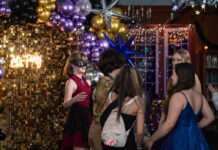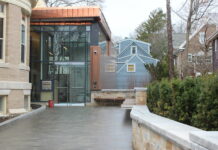Have you thought about hosting a community conversation at your library to foster civic engagement? In this interview, you will hear from Desiree Smelcer, Adult Services Librarian at the South Hadley Public Library, who is very experienced with hosting community conversations and planning civic engagement programs. The South Hadley Public Library was awarded a MBLC Civic Hub grant to support this important work. Read on to hear from Desiree about the South Hadley Public Library’s civic engagement activities.
What inspired you to apply for the MBLC Civic Hub grant?
Desiree Smelcer: My director, Joe Rodio, knows I have an interest in American History and a strong personal civic duty. He thought that the grant would be a good fit with upcoming programming into the 2020 election year. My position as Adult Services Librarian handles reference, archival materials, all tech, interlibrary and out of state loans, and adult programming. Watching the news and listening to people talk made me see that there was an uncomfortable shift in political discourse and the inability for people to discuss politics without succumbing to an emotional rather than rational response. I myself was guilty of this, and thought creating a platform for the library patrons to participate in and listen to authorities in a variety of subjects would help create a space for people to learn how to create a dialog without anger and frustration.
Please tell us about the Civics and Civility Creating Discourse in a Discordant Time Series.
Desiree Smelcer: The Civics and Civility: Creating Discourse in a Discordant Time was a series created from me studying peer reviewed resources to help determine topics and what were some of the pre-conceived notions that were presented to society at large. For example: Did you know that those who watch the 24 hour news coverage on TV believe that there is a wide gap in negativity between the Democratic and Republican Congressional representatives, compared to those who only watch the 6 pm nightly news?1 This is one of the main papers I hinged my programming on which was to help create a space to listen to differing viewpoints by leading lecturers in their field and in turn create a population that was informed with less bias than before. The topics were based on current events that had popped up over the past couple of years that I felt needed attention.
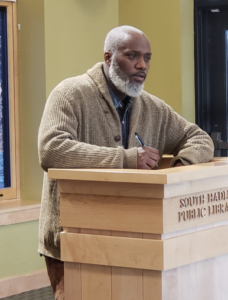
Programs included the following: Immigration, Politics in Health Care, Populist Conservatism, Gender Equality, Depolarizing Climate Change, Navigating Food for the Urban Consumer, The 24 Hour News Media and Its Impact on Politics, Money in Politics, The Opioid Epidemic in MA, Police Brutality in Urban Areas, The South Hadley Police Chief on how to Strengthen Community Relationships, Understanding Your First Amendment Rights and the Free Press, and Speaking with Rep. Dan Carey of Easthampton, MA.
Most people wonder how I was able to afford this program. If you ask nicely and ask curious thoughtful questions, people want to talk about what they are passionate about. The cost to have 14 lectures was less than $2,000.
Everything else went to materials for people to learn about these topics. Each program was well attended and in the post- questionnaire 90% of the listeners found new information that they found interesting and worth digesting for future consideration.
What lessons did you learn about how to host community conversations of divisive topics?
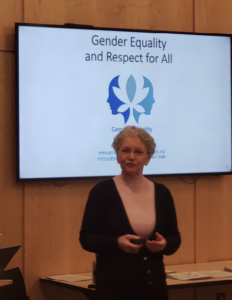
Desiree: Make your expectations known. I had to make sure that both sides, the lecturer, and those attending must not push a partisan view. I specifically asked that the speaker keep their comments neutral, unless they had specific legislative instances to discuss. I also asked for patrons who attended to hold their questions for the end, because usually the speaker would answer them before the end of the talk. This was only done because I find once a person feels they are not being “heard” they will shut off continuing to listen and become entrenched in their personal beliefs.
I asked for patrons to fill out pre and post questionnaires to gauge their knowledge of the topic and if they did or didn’t find a piece of the lecture interesting, informative, or if it changed a point of view. For most people, it gave them information to think about. However there is no way to gauge if it changed a person’s mind completely on a topic.
How did the library get involved with the 19th Amendment Centennial?
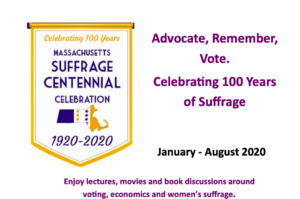 I love women’s history, and Women’s Studies in undergrad was one of my Minors. I have dressed up as a British Suffragette and an American one a few times for Halloween (when the library was open on those days). I felt that creating programming around the 100th Anniversary was a natural extension of the series that was just completed the year before.
I love women’s history, and Women’s Studies in undergrad was one of my Minors. I have dressed up as a British Suffragette and an American one a few times for Halloween (when the library was open on those days). I felt that creating programming around the 100th Anniversary was a natural extension of the series that was just completed the year before.
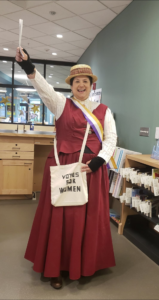
I didn’t want the discussion to be one sided. I wanted to show the varying and constant changing aspects of Female Suffrage in the US. I had programs set up about Ida B Wells, and The Grimke Sisters, Creating a More Diverse Community in the Suburbs, etc. However, Covid started right when the Suffrage Program was supposed to start. Unfortunately a third of the programs were cancelled because of it, and two thirds was rescheduled for later in the year. All of the rescheduling went on Zoom. Unfortunately the programming around persons of color was cancelled because the speaker could not find time in their schedule. Due to this we were accused of whitewashing in our programming. I had to repeatedly explain that this programming was the pieces we had to pick up after the COVID surge that we had over the Spring. The original programming was much more inclusive. The programs we did end up having were about Susan B Anthony, The Economics of Voting: What Does Game theory Say about Gaming?, The Pink Tax: The Economics of Being Female, and So Wide, So Deep Racism in the Suffrage Movement. Each program was well attended virtually, and recorded for future use.
How might you continue this work during the pandemic?
The South Hadley Public Library is an early voting place for two weeks prior to the November 3rd presidential election because we have the space to socially distance people who are coming in, and plenty of parking. We strive to make sure that people are aware of biased media sources and to check their media bias online during their use of social platforms.
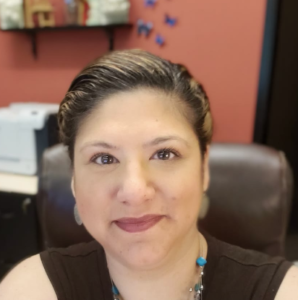
Interview with Desiree Smelcer, Adult Services Librarian, South Hadley Public Library
Interviewed by Michelle Eberle, Consultant, Massachusetts Library System
Citation: 1. Hibbing, John R., and Elizabeth Theiss-Morse. “The Media’s Role in Public Negativity Toward Congress: Distinguishing Emotional Reactions and Cognitive Evaluations.” American Journal of Political Science, vol. 42, no. 2, 1998, pp. 475–498. JSTOR, www.jstor.org/stable/2991767. Accessed 19 Oct. 2020.
This is the third is a series of interviews featuring civic engagement activities at libraries across the Commonwealth of Massachusetts.

